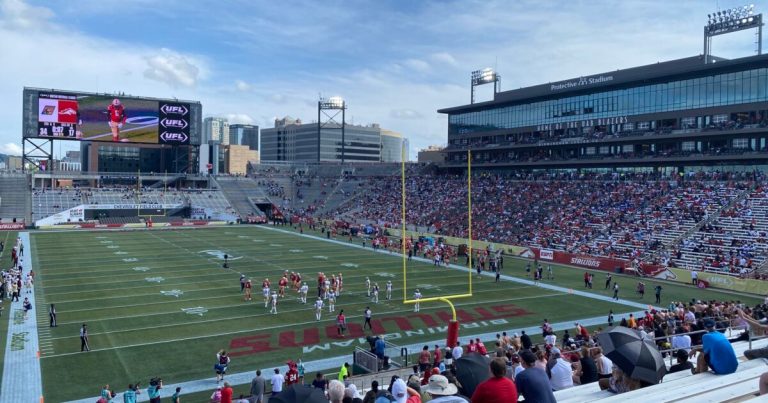A little Iron Bowl history (slideshow)
Reading time: 3 minutes

Getting fired up for the Iron Bowl?
Check out the history of the “big game” from our friends at Bhamwiki (we highly recommend this website for info on all things Birmingham).
Here are some of our favorite facts about the game:
As of November 2013:
Alabama leads the all-time series 44-35-1. (As of November 2015.)
Since the resumption of the series in 1948, the only head coaches to win the Iron Bowl in the first year at their school are Gene Stallings (Alabama-1990), Terry Bowden (Auburn-1993), Dennis Franchione (Alabama-2001), and Gus Malzahn (Auburn-2013). The only coaches to win their final Iron Bowl appearance are Stallings in 1996 and Bowden in 1997.
Since the resumption of the series, the only two Auburn coaches to win more than half of their Iron Bowls are Terry Bowden (1993-1997, 3-2), and Tommy Tuberville (1999-2008, 7-3). The only Alabama coaches to lose more than half of their Iron Bowl games as coach are the three who failed to win a single Iron Bowl: J.B. “Ears” Whitworth (1955-1957), Bill Curry (1987-1989), and Mike Shula (2003-2006).
Alabama has shut Auburn out 16 times (1894, 1905, 1906, 1948, 1952, 1959, 1960, 1961, 1962, 1966, 1973, 1975, 1992, 2008 and 2012), while Auburn has shut Alabama out eight times (1895, 1901, 1902, 1954, 1955, 1957, 1987 and 2000).
The largest margin of victory in the series is 55 points, when Alabama defeated Auburn 55-0 in 1948, the first game in the series since 1907.
Auburn’s largest margin of victory in the series is 48 points, when the Tigers defeated the Crimson Tide 53-5 in 1900.
Five games have been decided by one point. Auburn won by one point in 1949 (14-13), 1972 (17-16), 1982 (23-22) and 1997 (18-17), while Alabama won by one point in 1996 (24-23).
Since 1981, the Iron Bowl has been televised nationally on either a broadcast or cable network every season except 1993, when NCAA probation prevented Auburn from appearing on television.
Former Alabama head coach Mike Shula is the only Crimson Tide head coach to lose four consecutive games to Auburn, and is one of only three coaches to lose at least four consecutive games in the series. The others are Auburn’s Ralph Jordan (1959-1962) and (1964-1968) and Doug Barfield (1976-1980).
The longest winning streak in the series is held by Alabama at 9 games, from 1973 to 1981.
Auburn won six in a row from 2002 through 2007.
The game has been played in four cities: Auburn, Birmingham, Montgomery, and Tuscaloosa.
The greatest number of points given up by a team coached by Crimson Tide coach Bear Bryant occurred in the 1969 Iron Bowl. Auburn defeated Alabama, 49-26, ending a five-year Crimson Tide winning streak in the series.
Auburn and Alabama have never both had losing records in the same season.
Prior to 2012, Alabama had beaten Auburn in Tuscaloosa once (1-7), only scoring 35 points in the first six losses, and 36 points in their one win. Alabama scored 27 points in the 1-point loss in 2010. Alabama scored 49 points in the 2012 game.
Alabama has entered the Iron Bowl undefeated and untied on 15 (includes this year) occasions (1961, 1964, 1966, 1971, 1972, 1973, 1974, 1979, 1989, 1992, 1994, 2008, 2009, 2013, 2016), while Auburn has entered the game with an unblemished record five times (1957, 1971, 1993, 2004, 2010).
In the only Iron Bowl to match up two undefeated, untied squads, the Crimson Tide routed the Tigers 31-7 in 1971. Auburn and Alabama were both undefeated in 1994 (Auburn and Georgia had tied 23-23), and Alabama defeated Auburn 21-14. The only other team to enter the game undefeated and untied and lose the Iron Bowl was the 1989 Alabama squad; the Tigers defeated the Crimson Tide 30-20 in the first Iron Bowl game played at Jordan-Hare Stadium.



